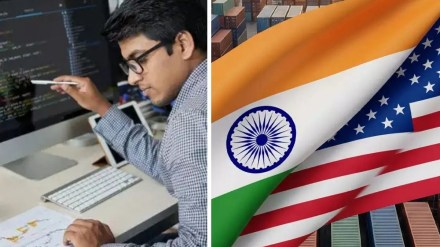In early 2025, more than 50,000 tech jobs have disappeared globally, driven by a combination of artificial intelligence disruption, cost-cutting, and broader industry downsizing. This wave of layoffs has hit Indian professionals on H-1B visas particularly hard, forcing many to reconsider their future in the United States. Major firms—including Microsoft, Meta, CrowdStrike, and Block—have been at the forefront of these job cuts, intensifying concerns around job security, the growing influence of automation, and the evolving nature of work.
Amid this climate of uncertainty, a viral Reddit post has sparked widespread discussion. The post reads: “AI has made jobs in tech, consulting, and other sectors easier. While it can’t yet handle highly complex tasks, it can still produce usable boilerplate solutions. As a result, companies may need fewer employees to complete the same amount of work. The U.S. is becoming increasingly anti-immigrant, and layoffs are fueling that sentiment. Politicians may cater to this mood by scapegoating H-1B visa holders. I think in 2-3 years, we’ll see a mass exodus of Indians and Chinese professionals returning home. What do you think?”
The post prompted a flood of responses: One commenter noted, “Politicians are accountable to voters. Compared to ten years ago, American high schools now offer robust computer science education. There’s no shortage of local talent. If AI can fill gaps and locals still can’t find jobs, the demand for foreign talent will naturally decline.” Another added, “The exodus has already started. F-1 visa holders are struggling to get H-1Bs. H-1Bs are getting laid off. L-1s are being called back. Don’t assume AI can’t handle complex problems—it can. If you’re not worried about your career in the age of AI, you’re simply not paying attention.”
Some users criticised misuse of the visa system, “The H-1B was intended for skills unavailable in the local market. Unfortunately, it’s been widely misused. With AI advancing, a growing domestic talent pool, and political pressure, stricter enforcement of H-1B rules is inevitable. Many came to the U.S. not for cutting-edge work or research, but simply because jobs were lacking at home. Those with general or outdated skills are most at risk.” Another perspective warned, “AI will first slow offshoring. Then it’ll impact hiring of new U.S. grads. Tech will still need smart, experienced workers for the next decade, so H-1Bs won’t vanish—but expect tighter regulations.” One practical suggestion stood out, “Live below your means. If your company has a strong presence in India and offers a good full-time role, consider relocating—especially if permanent residency seems unlikely. Even with a green card, relying solely on basic IT skills could be risky.”
